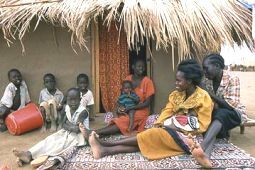Sudanese refugees’ tales of hardship in Kenya
NAIROBI, Kenya, July 22, 2005 (PANA) — Despite the comfort provided by
the relative security and safety of Kenya, Sudanese
refugees say life in Nairobi is unbearable and they will
do everything possible to enable them to return home
anytime soon to start a new life.

|
|
Half a million Sudanese refugees, like these in Kakuma camp in Kenya, could go home under the new peace deal for South Sudan. (UNHCR). |
“We have a right to a nationality, but we do not have any
nationality. There is nothing as painful as being called a
refugee in a country, the only one you have known since
birth,” said Thorne Kwer, a Sudanese refugee in Nairobi.
“I have a perception that Kenyans are hostile to
foreigners. What makes Kenyans so hostile? I have never
known of a country where you don’t hear of one becoming a
citizen even after living for 10 years. This is so
different from the US and Britain,” Kwer said.
Another refugee, Jimmy Garang, a Sudanese refugee in
Nairobi, sadly remembers the circumstances under which he
found himself in Nairobi and the hard life he has had to
endure during his 18 years in Ethiopia and Kenya as a
refugee.
“I have no idea what Sudan looks like now. All I know is
that we came to Kenya after the fall of our town near the
Kenyan border. The situation has been very bad for us but
Sudan is our country and we will return soon,” said
Garang, a Sales and Marketing student here.
“Sudan is our country. Life in Nairobi is for the wealthy.
As a refugee, I have to pay for my collage fees. I am a
self-sponsored student and life has been worse for me,” he
said.
Garang says he is not scared by the precarious situation
back in the southern Sudan, a vast region the size of
Kenya, Uganda and Tanzania combined, with not a single
paved road and with three outlets offering
telecommunication facilities.
Southern Sudan, endowed with riches such as oil, water and
fertile land, is ready to receive international assistance
to rebuild itself.
“We are sure we are ready to face the challenges there. I
will leave immediately after I sit my final exams in
November this year,” Garang told PANA in an interview.
The Reverend Paul Deng Thiong, also a refugee in Nairobi,
sees no peace in Sudan soon, saying the tension between
Khartoum and the Southerners is likely to linger on for
more years unless the international community steps up
efforts to ensure peace.
“What I know about Sudan is the war I ran away from. Sudan
is a war zone because nobody is willing to trust the other
person. The north is wondering why everybody is supporting
the southerners,” he said.
“I am willing to go back home even today if I am given the
support. All Sudanese people are willing to back. We are
Sudanese, even if born in oppression,” Thiong told PANA.
Southern Sudanese — who are mainly Christians and
non-believers — say they are being persecuted by the
Khartoum government, which was dominated by Arab-speaking
populations before the 9 January peace accord which made
SPLA/M leader John Garang as Vice President.
“The northerners have been eating from the pockets of the
Southerners. They are surprised where all the pressure to
democratise Sudan is coming from. They accuse the
Southerners of aligning with the Americans to persecute
Islam,” Thiong noted.
“What I know is that Sudan will need constant
international support to contain peace in the whole
country. Sudanese need the full support and commitment,”
Thiong said.
Sudanese President Omar el Bashir, who met US Secretary of
State Condoleezza Rice in Khartoum on Thursday, said he
would strive to maintain peace in the entire country,
something he has not done until his fellow oppressed
western Sudanese picked up guns in Darfur to demand
equality and justice.
The former military leader lifted decades of a state of
emergency declared in many parts of the country recently,
bringing it back to full civilian rule after the formation
of a national unity government.
But Sudanese refugees in Nairobi say they need more
freedom and enhanced access to information for Sudan to
flourish.
“You cannot get the right information about what is
happening in Sudan, the international news organisations
which visit Sudan never get to unearth what goes on
there,” Garang noted.
“The situation in Sudan during the war was devastating,
some died of the war, hunger and disease, there is no
access to the media, people do not know what is going on,
the media have no access to the true situation in that
country,” Garang reiterated.
Kwer says he would welcome any assistance to enable him go
home to Sudan and leave Kenya “where people are not even
considered for citizenship.”
